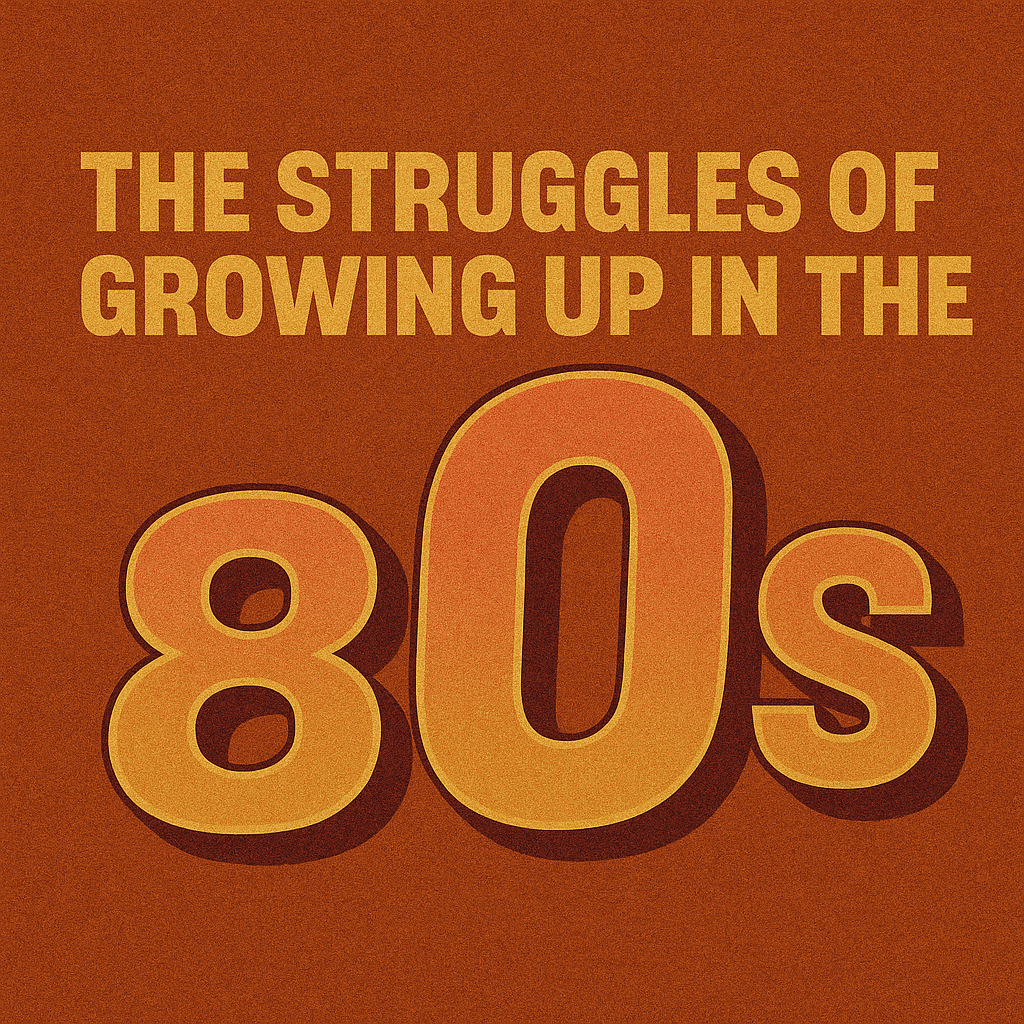A Gen X Reality Check
No Helmets, No Seatbelts, No Problem? (Actually, Big Problem.)
If you were a kid in the 80s, you likely rode your BMX bike full-speed down a hill with no helmet, no brakes, and no adult supervision. Seatbelts were optional at best. You sat in the way-back of the station wagon, facing traffic, playing paper football with your siblings as your mom smoked a Virginia Slim and Dad blasted Phil Collins. Safety? That was for nerds. We didn’t wear pads unless we were roller-skating. Even then, it was a gamble.
We were a generation forged in concrete driveways and gravel playgrounds. We got stitches, scars, and stories. There was no suing the neighbor if you broke your arm on their trampoline—you just got a cast and a Sharpie for your friends to sign.
Latchkey Life and the Art of Fending for Yourself
Welcome to the Latchkey Generation, where the front door key hung on a string around your neck and your best friend was an overworked microwave. Parents were working—or trying to—and kids were left to navigate the hours between school and dinner solo.
No cell phones. No text updates. Just a vague “be home before dark” and the understanding that if the streetlights were on and you weren’t home, you were in deep trouble. You learned independence early. We cooked our own food, made our own mistakes, and figured out how to fix them—usually before our parents got back from their shift.
It built resilience, sure. But it also came with loneliness, anxiety, and the sense that you were often on your own. And a lot of us were.
Stranger Danger Was Real—and We Knew It
Before true crime podcasts, there were missing child milk cartons. We didn’t just hear about danger; we lived with its constant shadow. Adam Walsh. Etan Patz. The names that haunted our TV screens during those early years shaped an entire generation’s worldview.
We were warned daily: don’t talk to strangers, don’t get in a van, memorize your phone number, and know your “safe word.” The news didn’t sugarcoat anything. Every crime was broadcast during dinner hour. You didn’t need nightmares—you had the 6 o’clock report.
This wasn’t helicopter parenting. It was the opposite: a strange blend of freedom and fear that kept us alert, street-smart, and skeptical.
When Bullying Was Just Called “Growing Up”
There was no cyberbullying in the 80s—but the bullying was very real. You faced it in the school halls, on the bus, or behind the 7-Eleven after school. Teachers didn’t intervene unless fists flew. Emotional abuse? That wasn’t a phrase yet.
If you didn’t fight back, you suffered in silence. If you did, you got detention—and a reputation. There was no “zero tolerance.” There was just tolerance. For cruelty. For exclusion. For surviving middle school with a thick skin and a quicker wit.
And if you were “different”? The 80s didn’t exactly embrace diversity. Racial tension, homophobia, body shaming, and gender roles were rampant. You learned to hide your true self, or you paid the price.
Technology Was a Luxury, Not a Given
No Wi-Fi. No iPhones. No Netflix. We were the last generation to grow up analog. Want to play a video game? You had to blow into the cartridge, say a prayer, and hope your NES didn’t freeze. Want to watch your favorite show? You had one shot. If you missed it, tough luck until reruns.
If you had a computer, it was a clunky Commodore 64 or an Apple IIe. And good luck printing anything without that screechy dot matrix printer. Our tech taught us patience, not instant gratification. We had to wait. For everything.
Even music wasn’t on demand. You sat by the radio for hours waiting to hit “record” on your boom box the second your favorite song came on. And heaven help you if the DJ talked over the intro.
The Unspoken Stuff: Mental Health, Family Dysfunction, and Keeping It Quiet
Therapy wasn’t a common word in the 80s, unless it was in a TV plotline. Depression, anxiety, ADHD? You were just “moody,” “lazy,” or “disruptive.”
Many of us grew up in households where alcoholism, financial stress, and emotional absence were normalized—or ignored. You didn’t talk about feelings. You sucked it up. Phrases like “man up,” “don’t cry,” or “deal with it” were standard parenting strategies.
We learned to internalize. To bury. To cope in silence. That’s the part of Gen X that’s rarely shown in nostalgic montages.
But Still—We Survived. And We Remember.
The 80s were a wild time to grow up. Yes, there were toys that could kill you, cartoons with hidden agendas, and entire summers lost to boredom and reruns. But there was also creativity, freedom, and an unmatched sense of identity forged in the fire of chaos.
We were misunderstood, underestimated, and under-supervised—but we made it. And today, we remember it all: the cassette tapes, the bruises, the independence, the trauma, the triumphs.
Because growing up in the 80s wasn’t always easy. But it was real. And for better or worse, it made us who we are.
So to every Gen Xer out there who made it through latchkey afternoons, Saturday morning cartoons, and the scars that came with them—this one’s for you. Now let’s rewind the tape, press play, and tell it like it was.
